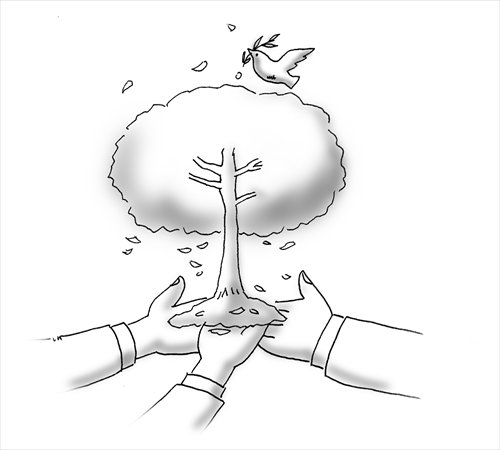Trilateral summit could bring new realism, trade interests to Northeast Asia

Illustration: Liu Rui/GT
It was the first trilateral China-Japan-South Korea summit since 2012, and the result was a clear signal of intent that Northeast Asia is moving a step away from tensions that have plagued the region and toward renewed cooperation.
While lingering issues of history remain prominent that were evident in both bilateral side meetings between Japanese Prime Minister Shinzo Abe and Chinese Premier Li Keqiang, and between Abe and South Korean President Park Geun-hye, concern for the future loomed larger. All three interdependent economies are slowing, and a compelling agenda of trade and finance drove the meeting's need for creating new momentum in Northeast Asia. In addition, the mutual problem of denuclearizing North Korea served as a point of unity for all three leaders.
The summit was a rare effort to address the major strategic dilemma in East Asia. The region is characterized by two contradictory trends: deepening inter-Asian economic integration but simultaneous growing security confrontation, evident in the East and South China Seas, and reflected in rising defense budgets across the region.
As Park concluded: "We reached the common recognition that the situation in which economic interdependence and political/security tensions coexist must be overcome in order to build permanent peace, stability and co-prosperity in the region, and to continue to develop trilateral cooperation unwaveringly."
The question now is whether the summit reflected just a temporary thaw of tensions, a trend of reducing distrust and a new realism of pragmatic cooperation, or only a suspension of political differences over history to pursue economic and financial cooperation?
Li summed up the problem at his press conference in Seoul, "For the reasons everyone knows, the trilateral process has been obstructed over the past three years. Mutual understanding on important issues, including history, is the precondition for mutual trust."
The underlying realities facing Asia's three largest economies may help explain the renewed impetus for cooperation. Seoul, Tokyo and Beijing all need to boost trade and investment to accelerate a flagging economic growth.
There is also pressure to move forward on a trilateral Free Trade Agreement (FTA). With the completion of the Trans-Pacific Partnership (TPP), if the Regional Comprehensive Economic Partnership (RCEP) is to move toward realization, a China-Japan-South Korea FTA must first be completed.
If RCEP talks drag on beyond 2016, the pan-Asian trade arrangement may fade as TPP gathers momentum in the region. South Korea and Indonesia have already expressed a strong interest in acceding to the TPP.
But without narrowing the trust gap, "squarely facing history," as the Joint Declaration put it, new economic and financial cooperation may be put at risk.
Continued improvement in South Korean-Japan relations will be one test of the durability of the process of trilateral cooperation. In her meeting with Abe, Park stressed the importance of an early resolution of the "comfort women" issue. Park told Abe that to remove a major obstacle to South Korean-Japan relations, Japan needs a resolution of the history problem that is acceptable to the victims and the South Korean people.
Abe's 70th anniversary of WWII speech underscored previous Japanese apologies, and made an effort to convey regrets of treatment of Chinese, but made no reference to the "comfort women." Li's meeting with Abe marked another step toward more normal Sino-Japanese relations. Security dialogue, crisis management mechanisms and parliamentary and other exchanges in the bilateral relationship that were suspended have resumed. But as Li pointed out, the bilateral relationship remains fragile, and Beijing looks for Japan to show a more forthright attitude toward events of WWII.
Stability in East Asia depends on the character of relations among the major powers. The China-Japan relationship is as critical to shaping the fate of Asia as French-German ties were to a stable, prosperous Europe after WWII.
For all its promise, the trilateral summit was an important renewal of much-needed cooperation, but clearly it remains a tenuous situation. The durability of Northeast Asia's new dynamic will depend on a maturity of all three actors in following through on the expectations raised.
The author is a senior fellow at the Atlantic Council. He served as a member of the US Department of State Policy Planning Staff from 2004 to 2008, and on the National Intelligence Council from 2008-12. opinion@globaltimes.com.cn. Follow him on Twitter at @Rmanning4.